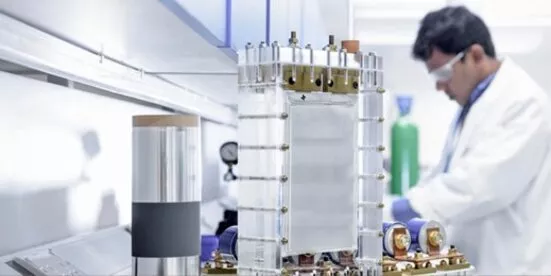
Reducing emissions in Germany’s food retail industry
According to the World Economic Forum, 25 per cent of all global greenhouse gas emissions are caused by the supply chains of the food industry.
Food retailers act as a link between manufacturers and service providers on the one hand, and consumers on the other. From this position, they can play a significant role in promoting sustainable development. They are faced with numerous challenges in terms of environmental and social impacts: from manufacturing, packaging, storing products to buildings (stores), notwithstanding transportation, logistics and storage. They also have a part to play in protecting biodiversity, animal welfare, nutrition.
The Science Based Targets Initiative (SBTi) established a Corporate Net-Zero Standard which is the world's only framework for corporate net-zero target setting in line with limiting global temperature rise to 1.5°C. The SBTi’s FLAG (Forest, Land and Agriculture) Guidance also provides the world’s first standard method for companies in land-intensive sectors to set science-based targets that include land-based emission reductions and removals. The guidance enables companies to reduce the 22 per cent of global greenhouse gas emissions from agriculture, forestry and other land use.
A pioneer in the industry
REWE Group, one of Europe’s largest retail and tourism groups, has taken the next step in its sustainability journey in July 2023 by committing its German brands, REWE & PENNY, to the Science Based Targets initiative (SBTi) standard for the food retail sector, including the recent FLAG (Forest, Land and Agriculture) guidance. It was one of the first food retail companies to publish climate targets according to this standard. Approval of the targets by the SBTi is expected for 2024. Overall, REWE Group aims to reduce the combined greenhouse gas emissions of REWE and PENNY by 10.5 million metric tons CO2 by 2030 (vs 2021).
Based on its newly established sustainability-linked bond framework, REWE Group placed a sustainability-linked bond (SLB) issue in September 2023, the repayment amount of which is linked to the achievement of sustainability goals of REWE and PENNY. The bond, with a nominal amount of €900 million and extending over a term of seven years, will support the company’s investments necessary to achieve its greenhouse gas emissions reduction goals throughout the entire supply chain.
Commit and invest
The bond is linked to three targets to be reached by 2029 (vs 2021): the reduction of scope 1 & 2 by 32 per cent, of scope 3 non-FLAG emissions by 32 per cent, and of scope 3 emissions by 23 per cent. If any of these targets is missed, a premium is payable at maturity. The action plan to achieve the scope 1 & 2 emissions target focuses on investments in retrofitting and transitioning to more environmentally friendly cooling agents as well as measures in the field of logistics. To decrease the scope 3 value chain (not land-related) emissions, REWE will rely on technological advancements and the efforts undertaken by its diverse range of suppliers. The reduction of scope 3 FLAG emissions (occurring upstream in the food production) requires a change in consumer behavior, demanding more climate-friendly, plant-based products while reducing their consumption of animal-based alternatives.
Learn more about Scope 1, 2 and 3 of the GHG Protocol
Societe Generale acted as Active Bookrunner for the sustainability-linked bond issue.
This sustainability-linked bond underscores how ambitious REWE’s climate strategy is and how embedded sustainability is in REWE’s core business. It was a pleasure to support the REWE team in this transaction, using our vast experience in this space,




